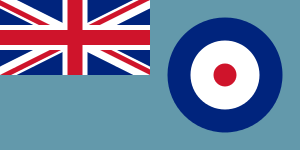Universities of Glasgow and Strathclyde Air Squadron
| Universities of Glasgow and Strathclyde Air Squadron | |
|---|---|
|
Crest Of UGSAS | |
| Active | 13 January 1941–Present |
| Country |
|
| Branch |
|
| Role | Officer Training, Ab Initio Flying Training, Recruiting |
| Part of | 3 FTS |
| Garrison/HQ | Glasgow / Glasgow International Airport |
| Motto | In Utrumque Paratus (prepared for either event) - giving the link between the sword of war and the dove of peace. |
| Colors | Black & Gold |
| Equipment | 2x Grob 115EA Tutor T.Mk1 |
| Insignia | |
| Identification symbol | The Squadron crest, approved in 1948, is described in heraldic terms "In front of a sword erect argent hilted up, a grey dove volant in bend holding in the beak a sprig of olive vert fructed sable". |
| Abbreviation | UGSAS |
Universities of Glasgow and Strathclyde Air Squadron (commonly known as UGSAS) is a Royal Air Force University Air Squadron drawing its members from six higher education establishments within Glasgow and its surrounding areas.
Its headquarters are based in the West End of Glasgow in the Park District and is equipped with three Grob Tutor aircraft which are based at the flying element of the squadron at Glasgow International Airport.
The Squadron has approximately 65 student members—the majority of whom hold the rank of Officer Cadet as members of the RAF Volunteer Reserve, and is split into two flights—Clydesdale and MacIntyre.
The Squadron is a remote unit of RAF Leuchars.
History
Formation and World War Two
The Squadron was formed as Glasgow University Air Squadron on 13 January 1941, initially recruiting only from the University of Glasgow and during the war years was actively engaged in the pre-entry training of students for the Royal Air Force. By the end of hostilities, some 400 members had entered the service in various aircrew categories though the Squadron did not operate aircraft during this period.
Post war changes
In 1946 the RAFVR was re-organised and the squadron was equipped with the de Havilland Tiger Moth and the Miles Magister and flying was carried out initially at the Royal Naval Air Station at Abbotsinch (HMS Sanderling), now Glasgow Airport, but when the airfield was having its runway's relaid in 1950, a move was made to Scone airfield at Perth, some 70 miles away from Glasgow. At the same time the Squadron was re-equipped with the De Havilland Chipmunk. In 1965 when the Royal College of Science and Technology became Strathclyde University the squadron was renamed to its current name to reflect this change. In 1969 the Squadron moved back to the now Glasgow Airport. The Scottish Aviation Bulldog replaced the Chipmunk in 1974.
The modern squadron
More recently students from the University of Stirling, Glasgow School of Art, Glasgow Caledonian University and The University of the West of Scotland have been eligible for Squadron membership and as of 1996 the Squadron became parent to No.4 Air Experience Flight and in March 2000 the squadron was equipped with its current aircraft, the Grob Tutor. In January 2008 the Squadron was re-organised into two flights – Clydesdale and MacIntyre – named in honour after Lord Clydesdale and David McIntyre, both were prominent aviators in the 1930s in 602 (City Of Glasgow) Sqn RAuxAF. The Squadron detaches up to three times a year for a period of three to four weeks at a time – usually to RAF Leuchars, RAF Lossiemouth or RAF Leeming – where it undertakes a period of intensive flying and adventure training.
Aircraft operated
- De Havilland Tiger Moth T.2 (1946-1950)
- Miles Magister (1946-1950)
- De Havilland Chipmunk T.10 (1950-1974)
- Scottish Aviation Bulldog T.1 (1974-2000)
- Grob 115E Tutor T.1 (2000-2010)
- Grob 115EA Tutor T.2 (2010-Present)
See also
- Birmingham University Air Squadron
- East of Scotland Universities Air Squadron
- Liverpool University Air Squadron
- Oxford University Air Squadron
- University Royal Naval Unit, the Royal Navy equivalent
- Officers Training Corps, the British Army equivalent
- List of Royal Air Force aircraft squadrons
References
External links
| ||||||||||||||||||||||||||||||||||||||||||||||

